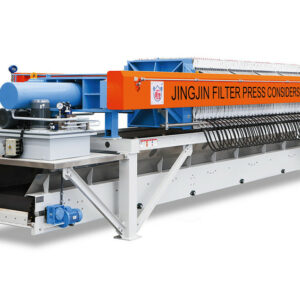When it comes to choosing the right filter press for your needs, there are a few factors you’ll want to take into account.
- What is a filter press and what are its uses?
A filter press is a machine used to separate liquids and solids. The liquids are forced through a filter medium and the solids are left behind. This is a common industrial process used to purify liquids and to separate solids from liquids. - How do you choose the right filter press for your needs?
When it comes to choosing the right filter press for your needs, there are a few things you need to take into account. The size of the press, the type of materials you will be filtering, and your production needs are all important factors to consider.
If you need a large-scale filter press for a high-volume production, you will want to consider a model that offers a large filter area. If you will be filtering viscous materials, you will also want to look for a press with a large filter cake discharge.
If you are looking for a smaller-scale filter press for lower-volume production or laboratory use, you will want to consider a model with a smaller filter area. If you will be filtering non-viscous materials, a filter press with a small filter cake discharge is adequate.
No matter what size of press you choose, make sure to select a model that is made of corrosion-resistant materials. This will ensure that your press lasts long and performs well. - What are the different types of filter presses available?
There are a few different types of filter presses available on the market. The first type is the plate and frame filter press. This type of filter press uses a series of plates and frames to create the filter cake. The filter cake is then squeezed between the plates to remove the liquid. The second type of filter press is the recessed plate filter press. filter press manufacturer This type of filter press uses recessed plates that allow the liquid to flow through the filter cake. This type of filter press is typically used for high viscosity liquids. The third type of filter press is the belt filter press. This type of filter press uses a series of belts to create the filter cake. The belt filter press is typically used for high volume applications. - What are the key features to look for in a filter press?
When looking for a filter press, there are a few key features you should keep in mind. The first is the size of the press. You need to make sure that the press is big enough to handle the amount of sludge you have. The second is the type of filter cloths that are available. Make sure that the cloths are the right size and fit the press properly. The last is the type of pump that is included. Make sure that the pump is strong enough to handle the amount of sludge that you have. - How do you operate and maintain a filter press?
To operate and maintain a filter press, you need to know how the press works and what each component does. The filter press consists of a number of filter plates that are fitted into a frame. The plates have a number of small holes in them that allow the liquid to pass through. The plates are then sealed together to form a chamber. The cake that is formed on the plates is then squeezed by the pressure of the liquid.
The filter press must be properly cleaned and maintained in order to ensure that it operates correctly. The plates and the frame should be cleaned and the cake should be removed after each use. The filter press should also be lubricated regularly to ensure that it functions smoothly. - What are the potential problems with filter presses and how can they be avoided?
Filter presses are a common piece of equipment in many industries, but they can present a few potential problems if not used correctly. One such problem is that the filters can become clogged, which can lead to a decrease in the efficiency of the press. In addition, the filters can also cause a buildup of material on the plates, which can lead to a decrease in the quality of the product. Finally, the filters can also release particles into the product, which can lead to contamination. All of these problems can be avoided by taking a few simple precautions, such as keeping the filters clean and free of clogs, and by using the correct type of filter for the application. - What are the benefits of using a filter press?
A filter press is a machine that is used to separate liquids and solids. The liquids pass through a filter cloth and the solids are left behind. This is a common method of separating solids and liquids in the manufacturing of paper, textiles, and other products. There are several benefits of using a filter press: - The filter press is a very efficient method of separating solids and liquids.
- The filter press can be used to process a variety of materials.
- The filter press is a reliable and sturdy machine.
- The filter press is easy to operate.
By taking the time to consider all of your options and carefully planning your purchase, you can be sure to find the perfect filter press for your needs.
